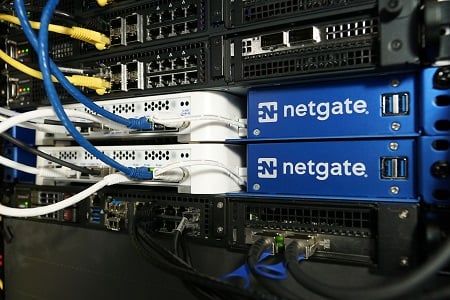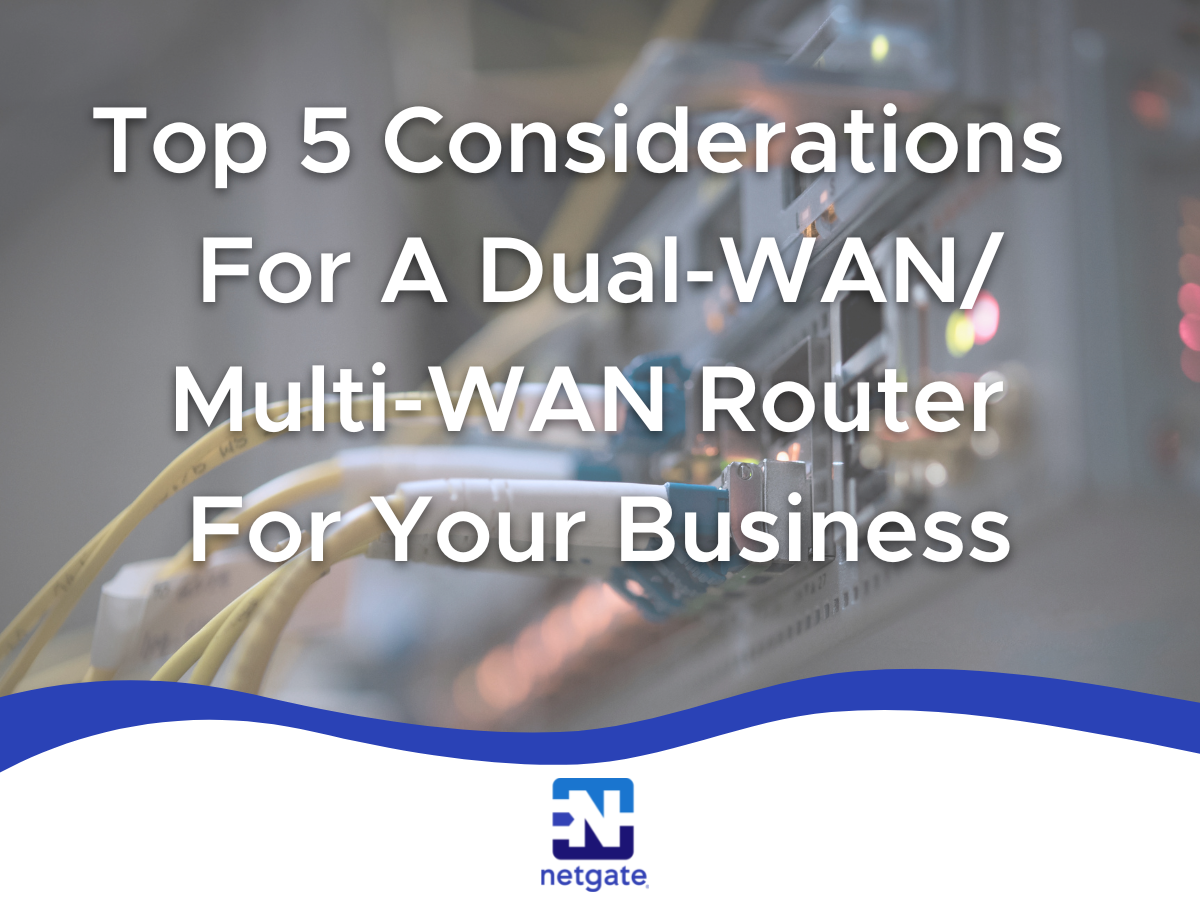What is a dual/multi-WAN router, and why do you need one for your business?
A dual-WAN router is a networking device that provides two separate Internet connections. Multiple Internet connections are beneficial for businesses that need to maintain a connection, even if one of their Internet providers goes down, or to provide additional bandwidth by sharing the load across several Internet Service Providers (ISPs). The "failover" feature of dual-WAN routers will typically automatically switch to the second Internet connection if the first one becomes unavailable or unreliable.
Multi-WAN routers are similar to dual-WAN routers but offer support for more than two Internet connections. Often used in large organizations, these devices provide a high level of redundancy.
Dual-WAN and multi-WAN routers can be affordable, provide peace of mind, and ensure that your business always has an Internet connection. Netgate® Security Gateway Appliances offer a feature-rich dual/multi-WAN router with a low total cost of ownership (TCO) no matter the size of your organization.
How can a multi-WAN router help improve your business' network performance and reliability?
A dual/multi-WAN router can benefit your business, improving network performance and reliability. One of the main advantages of a dual/multi-WAN router is if one of the WAN connections fails, the router will automatically fail over to the other connection. Failover means that your employees will be able to stay connected and productive, even if there is an issue with one of the ISPs.
Additionally, a dual/multi-WAN router can also help improve network performance. By using multiple WAN connections, businesses can increase their bandwidth and improve their speed. Businesses with fully-remote employees will also benefit from having their employees configured with dual-WAN connections to minimize downtime during an Internet provider service interruption. With a dual/multi-WAN router, businesses can ensure that their network is always available and running at optimal speeds, and that their remote workforce has minimal impact to their productivity.
What are the considerations when choosing a multi-WAN router for your business?
 When choosing a dual/multi-WAN router for your business, there are a few key considerations to keep in mind.
When choosing a dual/multi-WAN router for your business, there are a few key considerations to keep in mind.
- Will your router's performance or lack of capabilities bottleneck a multi-gigabit Internet connection? You will want to ensure that the router can support the connections and bandwidth for your business. Services that rely on small packet sizes, such as Voice over IP (VoIP), or encrypted traffic, such as VPN, should be considered when sizing a multi-WAN router.
- Future-proof your router. Will your multi-WAN router be able to handle faster connection speeds? You might currently have 1GbE WAN connections, but will your ISP roll out 2.5 GbE connections later this year?
- Decide how vital failover is. If you need a reliable connection, you will appreciate having a router with a robust failover system.
- Consider ease of use. A complex router can be challenging to manage, so it is important to choose one that is easy to manage with an intuitive interface.
- Factor in the router's total cost of ownership (TCO). Beyond the initial hardware investment, consider the cost of support and maintenance over the lifespan of your router.
By keeping these considerations in mind, you can ensure that you choose the best dual/multi-WAN router for your business.
How much should you expect to pay for a quality dual/multi-WAN router solution?
It is necessary to consider the Total Cost of Ownership (TCO) to determine how much you should expect to pay for a quality dual/multi-WAN router solution. TCO includes the initial purchase price, the cost of annual support, and the included features. For Small and Medium Businesses (SMBs) and Higher Education, a feature-rich dual/multi-WAN router solution can range from $2,000 - $4,000 for the initial hardware investment. The TCO for this type of router is typically between $3,000 - $5,000 per year. However, some routers have a TCO of over $10,000 per year. You often pay for a name over performance, ease of use, and feature set.
With Netgate Security Gateway Appliances, you can have a quality dual/multi-WAN router at an affordable price with no recurring fees for updates over the router's life. Adding a Technical Assistance Center (TAC) Professional and TAC Enterprise support plan, you will receive expert technical support worldwide from five continents via email, portal, or phone. Network experts are ready to assist with a four (4) or 24-hour initial response SLA from the Netgate Technical Assistance Center (TAC) for a low annual fee. Netgate provides a low TCO multi-WAN router solution for your business, remote workforce, and edge networks.
How to choose the right multi-WAN router for your business needs?
Multi-WAN routers are essential equipment for businesses that rely on the Internet to function. They provide a reliable connection but also offer redundancy in the event of an Internet outage. With so many options on the market, it can be challenging to know which is right for your business. Here is a brief overview of some key considerations:
Multi-WAN Terminology and Concepts: Multi-WAN routers come in various shapes and sizes. Some are designed for home use, while others are for business or industrial applications. The term “multi-WAN” itself refers to the ability of the router to connect to multiple Wide Area Networks (WAN) or Internet Service Providers (ISPs). Multiple connections can be beneficial for businesses that need additional available bandwidth or those that want a backup in case one of their providers goes down.
Segregation of Priority Services: Multi-WAN routers typically allow you to segregate traffic by service type. For example, you might want to prioritize voice traffic over email or data traffic. Traffic prioritization, or Quality of Service (QoS), can be crucial for businesses that rely on real-time communication, such as VoIP providers.
Complex/Combined Scenarios: In some cases, you may need more than two WAN connections. For example, you might have a primary connection for data, a secondary connection for voice, and a tertiary connection for the failover of either connection. Or, you might want to load-balance multiple connections together for increased speed and reliability. Multi-WAN routers can typically handle these scenarios.
Multi-WAN Caveats and Considerations: There are a few caveats to keep in mind when choosing a multi-WAN router. First, remember that not all WAN providers are offer the same functionality. Some may be faster than others, and some might be more reliable. Second, adding more high-speed WAN connections to increase your bandwidth requires a router that can support 1 GbE and up to 10 GbE connections.
Bandwidth aggregation: One final consideration is bandwidth aggregation. Suppose the goal is to provide more bandwidth for all the connected devices to share. The desire might be combining multiple WAN connections into one "pipe." True bandwidth aggregation typically requires Multi-Link PPPoE (MLPPP), which is rarely seen, because it requires that the WAN connections come from the same ISP, and the ISP has to support MLPPP as well. Instead, bandwidth aggregation is often achieved using simple to advanced load balancing over multiple Internet connections and providers.
Choosing the right multi-WAN router for your business can be a complex task, but using two WAN connections for basic load balancing and failover should be easy, without advanced configuration. However, by keeping these considerations in mind, you can narrow down your options and find the perfect fit for your needs.
A dual/multi-WAN router is a must-have for any business with critical network needs. Using a dual/multi-WAN router can improve your network performance and reliability while keeping costs low. When choosing a dual/multi-WAN router, there are several factors to consider. The five considerations listed above in this article will help you choose the right router for your business needs. Dual/multi-WAN routers can be affordable for businesses that need reliable networking performance.
Netgate Security Gateway Appliances offer a feature-rich dual/multi-WAN router with a low TCO and amazing support. If you are looking for more information on dual/multi-WAN routers or want to purchase one for your business, check out the Netgate Family of Security Gateways with pfSense® Plus software and the Netgate Family of TNSR® Appliances.
-01.png?width=926&height=181&name=Netgate%20Logo%20PMS%20(horizontal)-01.png)
%201.png?width=302&name=Netgate%20Logo%20PMS%20(horizontal)%201.png)


